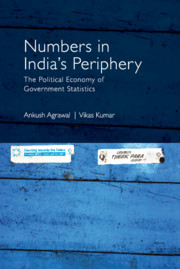
-
Select format
-
- Publisher:
- Cambridge University Press
- Publication date:
- 24 April 2020
- 29 October 2020
- ISBN:
- 9781108762229
- 9781108486729
- Dimensions:
- (228 x 152 mm)
- Weight & Pages:
- 0.66kg, 416 Pages
- Dimensions:
- Weight & Pages:
- Subjects:
- Demography, Social Statistics, Political Economy, Politics and International Relations, Sociology
You may already have access via personal or institutional login- Subjects:
- Demography, Social Statistics, Political Economy, Politics and International Relations, Sociology
Book description
This book analyses the quality of statistics such as geographic area, census population and sample survey statistics in a developing country. Using field interviews, archival sources, and secondary data covering the last seven decades, it explores the shifting relations between various kinds of statistics over their lifecycles and charts their cradle-to-grave political career. It uncovers a mutually constitutive relationship between data, development, and democracy and offers an exciting account of how government statistics are social artefacts dynamically shaped by political and economic factors. The book also quantifies the impact of data quality on the statistics of interest to policy makers such as household consumption expenditure and federal transfers. Numbers in India's Periphery makes a major contribution to the growing literature on the political economy of statistics in developing countries through a novel analysis of the shifting determinants of the nature of data in North East India.
Contents
Metrics
Altmetric attention score
Full text views
Full text views help Loading metrics...
Loading metrics...
* Views captured on Cambridge Core between #date#. This data will be updated every 24 hours.
Usage data cannot currently be displayed.
Accessibility standard: Unknown
Why this information is here
This section outlines the accessibility features of this content - including support for screen readers, full keyboard navigation and high-contrast display options. This may not be relevant for you.
Accessibility Information
Accessibility compliance for the HTML of this book is currently unknown and may be updated in the future.


